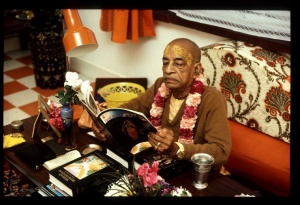CC Madhya 15.204 (1975): Difference between revisions
(Vanibot #0027: CCMirror - Mirror CC's 1996 edition to form a basis for 1975) |
(Vanibot #0020: VersionCompareLinker - added a link to the Version Compare feature) |
||
| Line 2: | Line 2: | ||
<div style="float:left">'''[[Sri Caitanya-caritamrta (1975)|Śrī Caitanya-caritāmṛta (1975)]] - [[CC Madhya (1975)|Madhya-līlā]] - [[CC Madhya 15 (1975)|Chapter 15: The Lord Accepts Prasādam at the House of Sārvabhauma Bhaṭṭācārya]]'''</div> | <div style="float:left">'''[[Sri Caitanya-caritamrta (1975)|Śrī Caitanya-caritāmṛta (1975)]] - [[CC Madhya (1975)|Madhya-līlā]] - [[CC Madhya 15 (1975)|Chapter 15: The Lord Accepts Prasādam at the House of Sārvabhauma Bhaṭṭācārya]]'''</div> | ||
<div style="float:right">[[File:Go-previous.png|link=CC Madhya 15.203 (1975)|Madhya-līlā 15.203]] '''[[CC Madhya 15.203 (1975)|Madhya-līlā 15.203]] - [[CC Madhya 15.205 (1975)|Madhya-līlā 15.205]]''' [[File:Go-next.png|link=CC Madhya 15.205 (1975)|Madhya-līlā 15.205]]</div> | <div style="float:right">[[File:Go-previous.png|link=CC Madhya 15.203 (1975)|Madhya-līlā 15.203]] '''[[CC Madhya 15.203 (1975)|Madhya-līlā 15.203]] - [[CC Madhya 15.205 (1975)|Madhya-līlā 15.205]]''' [[File:Go-next.png|link=CC Madhya 15.205 (1975)|Madhya-līlā 15.205]]</div> | ||
{{CompareVersions|CC|Madhya 15.204|CC 1975|CC 1996}} | |||
{{RandomImage}} | {{RandomImage}} | ||
==== TEXT 204 ==== | ==== TEXT 204 ==== | ||
<div class="verse"> | <div class="verse"> | ||
:pāka-śālāra | :pāka-śālāra dakṣiṇe--dui bhogālaya | ||
:eka-ghare śālagrāmera bhoga-sevā haya | :eka-ghare śālagrāmera bhoga-sevā haya | ||
</div> | </div> | ||
| Line 32: | Line 31: | ||
<div class="purport"> | <div class="purport"> | ||
Among the followers of the Vedic way, | Among the followers of the Vedic way, śālagrāma-śilā, the vigraha of Nārāyaṇa, is worshiped in the form of a stone ball. In India, every brāhmaṇa still worships the śālagrāma-śilā in his home. The vaiśyas and kṣatriyas may also engage in this worship, but it is compulsory in the house of a brāhmaṇa. | ||
</div> | </div> | ||
Latest revision as of 09:03, 27 January 2020
Śrī Caitanya-caritāmṛta (1975) - Madhya-līlā - Chapter 15: The Lord Accepts Prasādam at the House of Sārvabhauma Bhaṭṭācārya

His Divine Grace
A.C. Bhaktivedanta Swami Prabhupada
A.C. Bhaktivedanta Swami Prabhupada
TEXT 204
- pāka-śālāra dakṣiṇe--dui bhogālaya
- eka-ghare śālagrāmera bhoga-sevā haya
SYNONYMS
pāka-śālāra dakṣiṇe—on the southern side of the kitchen; dui bhoga-ālaya—two rooms for offering food; eka-ghare—in one room; śālagrāmera—of Lord Śālagrāma; bhoga-sevā—offering of food; haya—there is.
TRANSLATION
On the southern side of the kitchen were two rooms for offering food, and in one of them the food was offered to Śālagrāma Nārāyaṇa.
PURPORT
Among the followers of the Vedic way, śālagrāma-śilā, the vigraha of Nārāyaṇa, is worshiped in the form of a stone ball. In India, every brāhmaṇa still worships the śālagrāma-śilā in his home. The vaiśyas and kṣatriyas may also engage in this worship, but it is compulsory in the house of a brāhmaṇa.